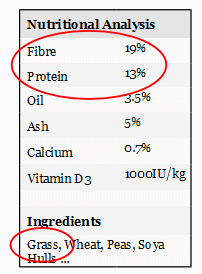
At first glance, choosing a brand of rabbit pellets can be a little overwhelming. Pet shops stock their shelves with foods that promise to be “gourmet”, “premium”, “fortified with vitamins”, or contain “all natural ingredients”. Don’t be tempted by this advertising; to get an accurate idea of how good a food is look at the nutritional analysis and ingredients list on the back of the packets instead.
- Fibre: The higher the fibre content (look for a minimum of 18%) generally the better the food will be for your rabbit’s digestion.
- Protein: A healthy adult rabbit needs a protein level of 12-14%. Young rabbits (under five months) need a higher protein level of around 16% to support their rapid growth.
- Calcium & Phosphorus: Calcium should be 0.5 – 1.0% and phosphorus 0.4-0.8%. Equally important is the ratio between the two (which should be 1.5-2:1 calcium to phosphorus).
- Fat: 2.4-5%
- Vitamins: Vitamin D 1000 IU/kg, Vitamin E 50 IU/kg, Vitamin A 10,000 IU/
- Ingredients: The ingredients list will be in the order of the proportion included; with the ingredient the food contains most of listed first. Look for brands that list grass (e.g. timothy, alfalfa, fescue, hay or ‘forage’) ahead of cereals (e.g. wheat, oats, corn, or maize). As grass is higher in fibre and lower in protein than cereals, foods that are grass-based generally also have a more suitable nutritional balance.
Food Comparison Table





